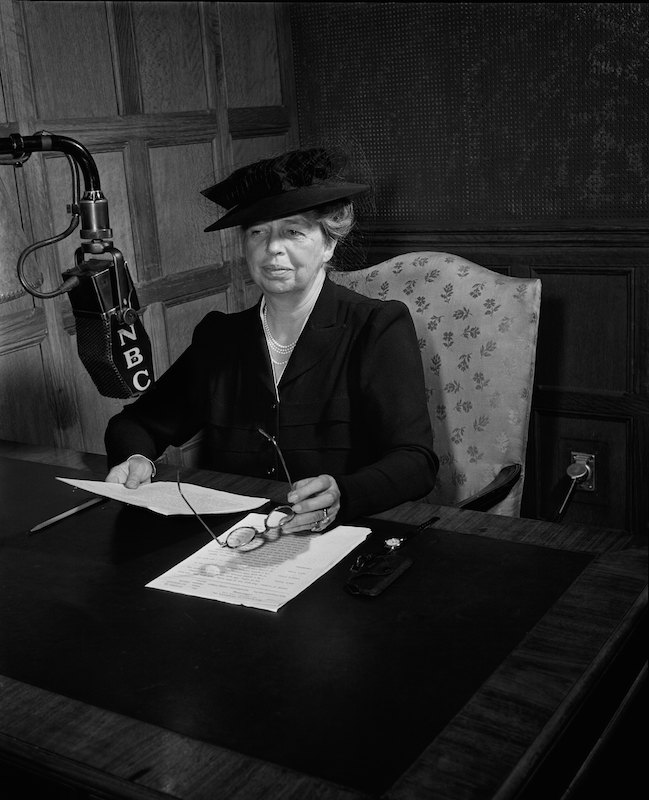
The speech given by President Franklin D. Roosevelt in the wake of the Dec. 7, 1941, attack by the Japanese on Pearl Harbor remains one of American history’s most famous orations: from his observation that the date would “live in infamy” to his request that Congress declare war, his words are—more than 75 years later—still associated with that moment in time.
But the President was not the only Roosevelt to give a speech of sorts. In fact, First Lady Eleanor Roosevelt addressed the American people before her husband did. Her weekly radio program, Over Our Coffee Cups, was already scheduled to go out on that Sunday, and she kept up the schedule, adding a few words of commentary on the news to the introduction to the story she had planned. She became, according to the FDR Library, the first public figure who spoke to the country about what had happened.
In her remarks on her broadcast, transcribed here courtesy of the Eleanor Roosevelt Papers Project, she let the nation in on what was going on in Washington at that moment—and spoke specifically to the women of America, who might not have been on their way to battle but were nevertheless deeply affected by the coming of war:
Good evening, ladies and gentlemen, I am speaking to you tonight at a very serious moment in our history. The Cabinet is convening and the leaders in Congress are meeting with the President. The State Department and Army and Navy officials have been with the President all afternoon. In fact, the Japanese ambassador was talking to the president at the very time that Japan’s airships were bombing our citizens in Hawaii and the Philippines and sinking one of our transports loaded with lumber on its way to Hawaii.
By tomorrow morning the members of Congress will have a full report and be ready for action.
In the meantime, we the people are already prepared for action. For months now the knowledge that something of this kind might happen has been hanging over our heads and yet it seemed impossible to believe, impossible to drop the everyday things of life and feel that there was only one thing which was important — preparation to meet an enemy no matter where he struck. That is all over now and there is no more uncertainty.
We know what we have to face and we know that we are ready to face it.
I should like to say just a word to the women in the country tonight. I have a boy at sea on a destroyer, for all I know he may be on his way to the Pacific. Two of my children are in coast cities on the Pacific. Many of you all over the country have boys in the services who will now be called upon to go into action. You have friends and families in what has suddenly become a danger zone. You cannot escape anxiety. You cannot escape a clutch of fear at your heart and yet I hope that the certainty of what we have to meet will make you rise above these fears.
We must go about our daily business more determined than ever to do the ordinary things as well as we can and when we find a way to do anything more in our communities to help others, to build morale, to give a feeling of security, we must do it. Whatever is asked of us I am sure we can accomplish it. We are the free and unconquerable people of the United States of America.
To the young people of the nation, I must speak a word tonight. You are going to have a great opportunity. There will be high moments in which your strength and your ability will be tested. I have faith in you. I feel as though I was standing upon a rock and that rock is my faith in my fellow citizens.
Now we will go back to the program we had arranged……
Experience Pearl Harbor in virtual reality with LIFE VR
The scheduled program involved, suitably, an interview with a soldier.
As Stephen Smith notes in his introduction to the book The First Lady of Radio, it was “an unprecedented moment for a First Lady”—speaking to the people before her husband did, and setting the national tone with her attitude of sympathy and steadfastness.
More Must-Reads From TIME
- The 100 Most Influential People of 2024
- The Revolution of Yulia Navalnaya
- 6 Compliments That Land Every Time
- What's the Deal With the Bitcoin Halving?
- If You're Dating Right Now , You're Brave: Column
- The AI That Could Heal a Divided Internet
- Fallout Is a Brilliant Model for the Future of Video Game Adaptations
- Want Weekly Recs on What to Watch, Read, and More? Sign Up for Worth Your Time
Write to Lily Rothman at lily.rothman@time.com